| Listing 1 - 8 of 8 |
Sort by
|
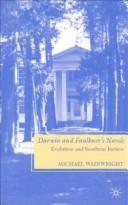
ISBN: 0230604625 9780230604629 1349372374 9786611976897 128197689X 0230612059 Year: 2008 Publisher: New York [etc.] Palgrave Macmillan
Abstract | Keywords | Export | Availability | Bookmark
 Loading...
Loading...Choose an application
- Reference Manager
- EndNote
- RefWorks (Direct export to RefWorks)
Darwin, Charles --- Faulkner, William --- Darwinisme social dans la littérature --- Evolutie (Biologie) in de literatuur --- Evolution (Biologie) dans la littérature --- Evolution (Biology) in literature --- Sociaal Darwinisme in de literatuur --- Social Darwinism in literature --- American fiction --- Southern States --- History and criticism --- Darwin, Charles Robert --- Influence --- Criticism and interpretation --- Social Darwinism --- Literature and science --- Intellectual life
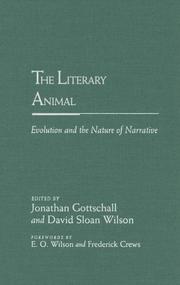
ISBN: 0810122863 0810122871 9780810122871 9780810122864 Year: 2005 Publisher: Evanston, Ill. Northwestern University Press
Abstract | Keywords | Export | Availability | Bookmark
 Loading...
Loading...Choose an application
- Reference Manager
- EndNote
- RefWorks (Direct export to RefWorks)
Evolution. Phylogeny --- Thematology --- Literary rhetorics --- Literature and science. --- Evolution (Biology) in literature. --- Human beings in literature. --- Narration (Rhetoric) --- Littérature et sciences --- Evolution (Biologie) dans la littérature --- Homme dans la littérature --- Narration --- Narration (Rhetoric). --- Evolution. --- Narration. --- Man in literature --- Philosophy --- Creation --- Emergence (Philosophy) --- Teleology --- Poetry and science --- Science and literature --- Science and poetry --- Science and the humanities --- Literaturtheorie --- Evolutionstheorie --- Aufsatzsammlung --- Littérature et sciences --- Evolution (Biologie) dans la littérature --- Homme dans la littérature --- Evolution (Biology) in literature --- Human beings in literature --- Literature and science --- Narrative (Rhetoric) --- Narrative writing --- Rhetoric --- Discourse analysis, Narrative --- Narratees (Rhetoric) --- Littérature --- Évolution (biologie) -- Dans la littérature --- Homme -- Dans la littérature --- Philosophie --- Littérature --- Évolution (biologie) -- Dans la littérature --- Homme -- Dans la littérature
Book
ISBN: 9781107127524 9781316422700 9781107566811 Year: 2016 Publisher: Cambridge : Cambridge University Press,
Abstract | Keywords | Export | Availability | Bookmark
 Loading...
Loading...Choose an application
- Reference Manager
- EndNote
- RefWorks (Direct export to RefWorks)
Evolutionary theory sparked numerous speculations about human development, and none was so ardently embraced as the idea that children are animals recapitulating the ascent of the species. After Darwin's Origin of Species, scientific, pedagogical, and literary works featuring beastly babes and wild children interrogated how our ancestors evolved and what children must do in order to repeat this murky course to humanity. Exploring fictions by Rudyard Kipling, Lewis Carroll, Frances Hodgson Burnett, Charles Kingsley, and Margaret Gatty, Jessica Straley argues that Victorian children's literature not only adopted this new taxonomy of the animal child, but also suggested ways to complete his/her evolution. In the midst of debates about elementary education and the rising dominance of the sciences, children's authors plotted miniaturized evolutions for their protagonists and readers, and, more pointedly, proposed that the decisive evolutionary leap for both our ancestors and ourselves is the advent of the literary imagination.
LITERARY CRITICISM / European / English, Irish, Scottish, Welsh. --- Children's literature, English --- Evolution (Biology) in literature. --- Imagination in literature. --- Littérature de jeunesse anglaise --- Evolution (Biologie) dans la littérature --- Imagination dans la littérature. --- History and criticism. --- Histoire et critique --- Littérature anglaise --- Littérature pour la jeunesse anglaise --- Évolution (biologie) --- Imagination --- Dans la littérature --- Littérature de jeunesse anglaise --- Evolution (Biologie) dans la littérature --- Imagination dans la littérature. --- Histoire et critique. --- Dans la littérature. --- Littérature anglaise pour la jeunesse
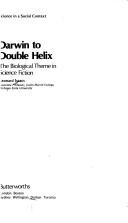
ISBN: 040871302X 9780408713023 Year: 1977 Publisher: London Butterworths
Abstract | Keywords | Export | Availability | Bookmark
 Loading...
Loading...Choose an application
- Reference Manager
- EndNote
- RefWorks (Direct export to RefWorks)
Philosophy of nature --- Darwin, Charles --- Science fiction, English --- Science fiction, American --- Evolution (Biology) in literature --- Literature and science --- Science-fiction anglaise --- Science-fiction américaine --- Evolution (Biologie) dans la littérature --- Littérature et sciences --- History and criticism --- Histoire et critique --- -Science fiction, English --- -Evolution (Biology) in literature --- English science fiction --- English fiction --- American science fiction --- American fiction --- Poetry and science --- Science and literature --- Science and poetry --- Science and the humanities --- Science-fiction américaine --- Evolution (Biologie) dans la littérature --- Littérature et sciences --- Evolution dans la litterature --- Sciences dans la litterature
Book
ISBN: 9780820346755 9780820346908 082034690X 9780820344485 0820344486 0820346756 9781306827485 1306827485 Year: 2014 Publisher: Athens London University of Georgia Press
Abstract | Keywords | Export | Availability | Bookmark
 Loading...
Loading...Choose an application
- Reference Manager
- EndNote
- RefWorks (Direct export to RefWorks)
"The 16 essays in this collection explore the distinctive qualities of America's textual engagement with Darwinism--the ways in which Darwinian language and theories have made their way into American Literary and cultural texts, providing writers a new vocabulary to describe human affairs and interactions with other living organisms. The editors argue that attention to the specifics of Darwin's place in the American scene is vital in light of the particularities of the reception and uses of evolutionary theory in the U.S.--i.e. the nation's melting pot identity, its slave past, its particular brands of social Darwinism, and its school of Pragmatist philosophy. In her review of the proposal, Laura Dassow Walls pointed out that one of the most exciting aspects of this project is that the editors and authors are reading a wide range of Darwin's own texts and thereby recovering the Darwin that Americans actually encountered, the more subtle and challenging Darwin who energized modernist American literature, not the Social Darwinist constructed by Herbert Spencer"-- "While much has been written about the impact of Darwin's theories on U.S. culture, and countless scholarly collections have been devoted to the science of evolution, few have addressed the specific details of Darwin's theories as a cultural force affecting U.S. writers. America's Darwin fills this gap and features a range of critical approaches that examine U.S. textual responses to Darwin's works.The scholars in this collection represent a range of disciplines--literature, history of science, women's studies, geology, biology, entomology, and anthropology. All pay close attention to the specific forms that Darwinian evolution took in the United States, engaging not only with Darwin's most famous works, such as On the Origin of Species, but also with less familiar works, such as The Expression of the Emotions in Man and Animals. Each contributor considers distinctive social, cultural, and intellectual conditions that affected the reception and dissemination of evolutionary thought, from before the publication of On the Origin of Species to the early years of the twenty-first century. These essays engage with the specific details and language of a wide selection of Darwin's texts, treating his writings as primary sources essential to comprehending the impact of Darwinian language on American writers and thinkers. This careful engagement with the texts of evolution enables us to see the broad points of its acceptance and adoption in the American scene; this approach also highlights the ways in which writers, reformers, and others reconfigured Darwinian language to suit their individual purposes. America's Darwin demonstrates the many ways in which writers and others fit themselves to a narrative of evolution whose dominant motifs are contingency and uncertainty. Collectively, the authors make the compelling case that the interpretation of evolutionary theory in the U.S. has always shifted in relation to prevailing cultural anxieties"--
Darwinisme social dans la littérature --- Evolutie (Biologie) in de literatuur --- Evolution (Biologie) dans la littérature --- Evolution (Biology) in literature --- Sociaal Darwinisme in de literatuur --- Social Darwinism in literature --- American literature --- History and criticism --- Darwin, Charles Robert --- Influence --- Literature and science --- United States --- Social Darwinism --- James, William --- Criticism and interpretation --- Burroughs, John --- Melville, Herman --- Wharton, Edith Newbold --- Bellamy, Edward --- Gilman, Charlotte Perkins --- Norris, Frank --- Morgan, Lewis Henry --- London, Jack --- Boyle, T. Coraghessan --- SCIENCE / Philosophy & Social Aspects. --- LITERARY CRITICISM / American / General. --- Social Darwinism in literature. --- Evolution (Biology) in literature. --- Poetry and science --- Science and literature --- Science and poetry --- Science and the humanities --- History and criticism. --- Darwin, Charles, --- Influence.
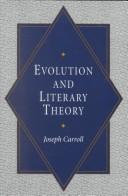
ISBN: 0826209793 9780826209795 Year: 1995 Publisher: Columbia; London University of Missouri press
Abstract | Keywords | Export | Availability | Bookmark
 Loading...
Loading...Choose an application
- Reference Manager
- EndNote
- RefWorks (Direct export to RefWorks)
82.0 --- Biology in literature --- Criticism --- Evolution in literature --- Literature and science --- Evolution (Biology) in literature --- Poetry and science --- Science and literature --- Science and poetry --- Science and the humanities --- Appraisal of books --- Books --- Evaluation of literature --- Literary criticism --- Literature --- Rhetoric --- Aesthetics --- Style, Literary --- 82.0 Literatuurtheorie --- Literatuurtheorie --- Appraisal --- Technique --- Evaluation --- Darwin, Charles --- -Influence --- Biologie dans la littérature --- Biologie in de literatuur --- Evolutie (Biologie) in de literatuur --- Evolution (Biologie) dans la littérature --- Literatuur en wetenschappen --- Littérature et sciences --- Biology in literature. --- Evolution (Biology) in literature. --- Evolution in literature. --- Literature and science. --- Darwin, Charles, --- Darwin, Charles, Robert --- Influence. --- Criticism. --- Darwin, Charles Robert --- Influence
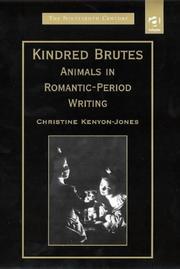
Abstract | Keywords | Export | Availability | Bookmark
 Loading...
Loading...Choose an application
- Reference Manager
- EndNote
- RefWorks (Direct export to RefWorks)
Animals in literature --- Animals in poetry --- Animaux dans la littérature --- Animaux dans la poésie --- Beast epic --- Dieren in de literatuur --- Dieren in de poëzie --- Dierenepiek --- Dierenepos --- Dierenfabels --- Dierenromans --- Dierensprookjes --- Dierenverhalen --- Epopées animales --- Evolutie (Biologie) in de literatuur --- Evolution (Biologie) dans la littérature --- Evolution (Biology) in literature --- Fables ésopiques --- Human-animal relationships in literature --- Man-animal relationship in literature --- Mens-dier relaties in de literatuur --- Relations homme-animal dans la litérature --- English literature --- -Evolution (Biology) in literature --- Romanticism --- -Pseudo-romanticism --- Romanticism in literature --- Aesthetics --- Fiction --- Literary movements --- British literature --- Inklings (Group of writers) --- Nonsense Club (Group of writers) --- Order of the Fancy (Group of writers) --- History and criticism --- Darwin, Charles --- -Influence --- -History and criticism --- Darwin, Charles, --- Darwin, Charles, Robert --- Influence. --- Darwin, Charles Robert --- Influence --- 19th century --- Great Britain
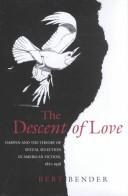
ISBN: 0812233441 1512814296 058517198X Year: 1996 Publisher: Philadelphia University of Pennsylvania Press
Abstract | Keywords | Export | Availability | Bookmark
 Loading...
Loading...Choose an application
- Reference Manager
- EndNote
- RefWorks (Direct export to RefWorks)
Upon its publication in 1871, Charles Darwin's The Descent of Man and Selection in Relation to Sex sent shock waves through the scientific community and the public at large. In an original and persuasive study, Bert Bender demonstrates that it is this treatise on sexual selection, rather than any of Darwin's earlier works on evolution, that provoked the most immediate and vigorous response from American fiction writers. These authors embraced and incorporated Darwin's theories, insights, and language, creating an increasingly dark and violent view of sexual love in American realist literature.In The Descent of Love, Bender carefully rereads the works of William Dean Howells, Henry James, Elizabeth Stuart Phelps, Sarah Orne Jewett, Kate Chopin, Harold Frederic, Charles W. Chesnutt, Edith Wharton, and Ernest Hemingway, teasing from them a startling but utterly convincing preoccupation with questions of sexual selection. Competing for readership as novelists who best grasped the "real" nature of human love, these writers also participated in a heated social debate over racial and sexual differences and the nature of sex itself. Influenced more by The Descent of Man than by the Origin of Species, Bender's novelists built upon Darwin's anthropological and zoological materials to anatomize their character's courtship behavior, returning consistently to concerns with physical beauty, natural dominance, and the power to select a mate.Bringing the resources of the history of science and intellectual history to this, the first full-length study of the impact of Darwin's theories in American literature, Bender revises accepted views of social Darwinism, American literary realism, and modernism in American literature, forever changing our perceptions of courtship and sexual interaction in American fiction from 1871 to 1926 and beyond.
Amour dans la littérature --- Choix du conjoint dans la littérature --- Courtiser dans la littérature --- Courtship in literature --- Evolutie (Biologie) in de literatuur --- Evolution (Biologie) dans la littérature --- Evolution (Biology) in literature --- Hofmaken in de literatuur --- Hommes et femmes [Relations entre ] dans la littérature --- Liefde in de literatuur --- Love in literature --- Man-vrouw relaties in de literatuur --- Man-woman relationships in literature --- Mate selection in literature --- Partnerskeuze in de literatuur --- Relations entre hommes et femmes dans la littérature --- Seksualiteit in de literatuur --- Sex in literature --- Sexe dans la littérature --- American fiction --- 19th century --- History and criticism --- 20th century --- Love stories [American ] --- Literature and science --- United States --- History --- Darwin, Charles Robert --- Influence --- English influences --- Howells, William Dean --- Criticism and interpretation --- Chesnutt, Charles Waddell --- Wharton, Edith Newbold --- Frederic, Harold --- James, Henry --- Phelps, Elizabeth Stuart --- Jewett, Sarah Orne --- Chopin, Kate O'Flaherty --- Hemingway, Ernest --- Sex in literature. --- Love in literature. --- Courtship in literature. --- Mate selection in literature. --- Evolution (Biology) in literature. --- Love stories, American --- English influences. --- History and criticism. --- Darwin, Charles, --- Influence. --- American romance fiction --- Romance fiction, American
| Listing 1 - 8 of 8 |
Sort by
|

 Search
Search Feedback
Feedback About UniCat
About UniCat  Help
Help News
News